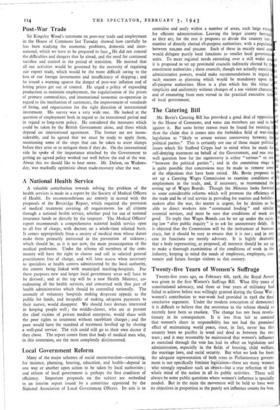Post-War Trade
Sir Kingsley Wood's statement on post-war trade and employment in the House of Commons last Tuesday showed how carefully he has been studying the economic problems, domestic and inter- national, which we have to be prepared to face., He did not conceal the difficulties and dangers that lie ahead, and the need for continued sacrifice and control in the period of transition. He insisted that all our activities would be governed by the necessity of regaining our export trade, which would be the more difficult owing to the loss of our foreign investments and insufficiency of shipping ; and he issued a warning against the danger of post-war inflation and of letting prices get out of control. He urged a policy of expanding production to maintain employment, the regularisation of the prices of primary commodities, and international economic co-operation in regard to the mechanism of currencies, the improvement of standards of living, and organisation for the right direction of international investment. His survey was a very wide one. He looked at the question of employment both in regard to he transitional period and in regard to long-term policy. He considered the measures which could be taken by the British Government alone, and those which depend on international agreement. The former are not incon- siderable, and he agreed that we must be ready to apply them, mentioning some of the steps that can be taken to avert slumps before they arise or to mitigate them if they do. On the international side he spoke of the importance attached by the Government to getting an agreed policy worked out well before the end of the war. About this we should like to hear more. Mr. Dalton, on Wednes- day, was markedly optimistic about trade-recovery after the war.


























 Previous page
Previous page